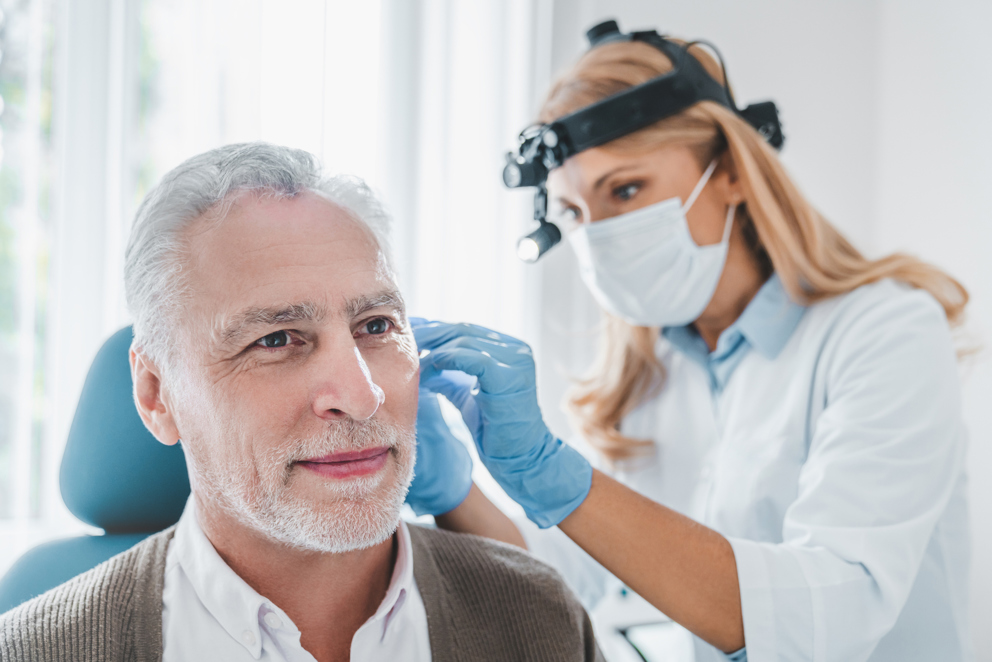
Many people live in denial about their hearing problems, often ignoring symptoms and delaying seeking help for years. This reluctance to address hearing issues can lead to decline in the quality of life and even exacerbate the problem. That's why it's crucial to shine a light on when and why it's important to see an audiologist.
Audiologists are healthcare professionals specializing in hearing and balance disorders – and can expertly evaluate, diagnose, and treat numerous hearing health issues, including hearing loss, tinnitus, excessive earwax, dizziness, balance problems, and more. Audiologists conduct hearing screenings, determine issues, recommend solutions, and provide aftercare.
Top Signs When to See an Audiologist: Patients’ Guide to Better Hearing Health

Untreated hearing problems – including hearing loss – can impact every aspect of your life, physically, mentally, and emotionally. Therefore, it’s essential to proactively take care of your hearing health so you can live your best, happiest, most vibrant life at any age. Maintaining good hearing health will allow you to enjoy conversations with loved ones, listen to your favorite songs and TV shows, and hear sounds that many people take for granted – like birds chirping, children laughing, etc.
On the other hand, untreated hearing loss can cause numerous and serious problems, including higher risks of depression, anxiety, and even dementia. And tinnitus, a common problem that affects 15% to 20% of people, causes ringing (or buzzing, roaring, clicking, or humming) in the ears, which can be quite annoying and frustrating. An astounding 16 million people seek professional help for tinnitus each year, and 90% of tinnitus cases have underlying hearing loss.
Decoding the Signals: Understanding When to See an Audiologist
If you’re experiencing untreated hearing loss, you may choose to stay home instead of going out with family and friends because you can’t actively participate in conversations. You may feel embarrassed asking people to repeat themselves because you didn’t hear them properly the first time they spoke. You may be passed over for promotions or raises at work because you aren’t participating in meetings, or aren’t hearing – and following – directions properly.
Audiologists understand that untreated hearing loss – and other hearing health issues like tinnitus – can have repercussions that extend into all areas of your life. They’ll work with you to find the best solutions to help you hear better so you can experience life to the fullest!
Sometimes, people try to convince themselves that they don’t need to see an audiologist because their hearing loss isn’t bad enough to warrant hearing aids, their hearing loss will improve on its own, and other common myths around hearing health. In truth, seeing an audiologist is a smart, proactive way to take control of your hearing health.
Treating a condition like hearing loss can help improve more than “just” your physical symptoms. It can also improve your social life, helping you feel less isolated and depressed, and also reduce the risks of anxiety and cognitive decline. If you think you (or a loved one) need to see an audiologist, do it! There are many benefits to doing so!
The Scope of Audiology: What Conditions Do Audiologists Treat?

Audiologists are trained to diagnose, manage, and treat a variety of hearing health issues, like:
Hearing loss
Are you having trouble hearing conversations, especially in noisy places like restaurants? Do you frequently turn up the volume on the TV? Do you ask people to repeat themselves because you didn’t hear them clearly the first time? These are all common signs of hearing loss. While hearing loss can happen at any age, the chances increase as you get older. The average person with hearing loss waits seven years before seeking help. Don’t be that person! See an audiologist for a hearing screening, solutions, and support. It will change your life for the better!
Tinnitus
This condition causes annoying “ringing in your ears,” can worsen over time, and even become permanent if it’s not treated. Therefore, see an audiologist to help resolve the issue and prevent any existing damage from getting worse. Not everyone hears ringing. Some people hear buzzing, humming, or clicking instead. The sounds can feel relentless, but an audiologist can offer solutions – which may include hearing aids – to provide relief.
Earwax buildup
Everyone’s ears produce wax to help keep out dirt and debris but, sometimes, excessive wax can build up and cause hearing loss, discomfort, and other issues. Don’t try to remove earwax yourself! See an audiologist, who is trained to remove the earwax without damaging the ear.
Sudden loss of hearing
Sudden hearing loss can be scary. If you experience this, see an audiologist right away. Various things can cause this, including earwax buildup or an ear infection, but any unexplained, sudden hearing loss requires an immediate appointment with an audiologist to assess the situation and to rule out anything more serious.
Audiologist Qualifications
The qualifications of an audiologist may depend on where they are in the world, but in general,
a doctor of audiology (Au.D.), or audiologist, is a hearing care professional who handles a variety of hearing health issues. Audiologists can identify, diagnose, and treat hearing loss, tinnitus, balance issues, and other hearing health conditions. They also conduct hearing screenings and provide solutions, such as hearing aids. Since an audiologist cannot perform surgeries or prescribe medications, they commonly refer patients to an ENT (ear, nose, and throat) doctor for help with medical conditions and treatments.
Navigating Your Hearing Health Journey: Should I See an Audiologist or ENT First?

Both audiologists and ENTs deal with hearing health and can diagnose and treat a variety of conditions. An audiologist is an expert in diagnosing hearing loss and using technological solutions – such as hearing aids – to help you manage and live with it. An ENT doctor deals with medical issues, including conditions needing prescriptions and surgery.
If you have ear pain or hearing loss, an audiologist is often the best place to start your hearing care journey. Audiologists excel at conducting hearing screenings, recommending solutions like hearing aids, fitting patients for hearing aids, and adjusting the devices to maximize success.
Audiologists may not always be able to provide the necessary treatment for every condition. For instance, if you have a tumor in your ear that’s causing hearing loss, the audiologist will refer you to an ENT for evaluation and, possibly, surgery. Additionally, an audiologist will refer you to an ENT to treat things like an ear infection that require prescription medication to resolve. While hearing loss frequently happens as people age, it can also be a symptom of other medical conditions, which would more likely be treated by an ENT.
See an audiologist when you:
- Have excessive earwax. An audiologist can remove earwax to help resolve hearing difficulties and/or discomfort.
- Experience hearing loss. An audiologist will conduct a hearing screening, determine the severity of the loss, and recommend solutions – like hearing aids – if necessary.
- Have ringing in your ears. Tinnitus, a ringing or buzzing in the ears, can be bothersome and irritating. Audiologists can treat this condition, sometimes with hearing aids.
- Have sudden hearing loss. Sudden hearing loss can sometimes be caused by things like excess earwax, which can be easily handled by an audiologist. Other problems, especially medical issues like tumors or infections, will likely be referred to an ENT.
- Experience balance and dizziness problems. In many cases, audiologists can help with balance issues and dizziness. If they determine a medical cause or condition, they will likely refer you to an ENT for further evaluation and treatment.
See an ENT when you:
- Have medical issues impacting the ear. If you have any ear-related medical issues – including ear infections, tumors, disease, etc. – see an ENT.
- Have head/ear trauma. Trauma and injury may need surgery, medication, or other treatments from an ENT.
- Have hearing loss resulting from medications (ototoxicity). See an ENT first, but they may refer you to an audiologist for hearing aids as part of your treatment.
Have otosclerosis (fused bones). This condition may be a sign of bone growth that’s impeding normal movement within the ear, which may need to be resolved via surgery.
Amplifying Life: Benefits of Seeing an Audiologist

Audiologists excel at helping their patients maintain their hearing health. Audiologists can:
Conduct hearing screenings
Regular hearing screenings can help identify any hearing loss so it can be properly treated. Hearing screenings are an easy, accurate way to evaluate hearing loss and its severity. Based on the results, your audiologist may recommend hearing aids.
Fit and adjust hearing aids
When your audiologist recommends hearing aids, they’ll fit the devices, which involves programming the hearing aids and adjusting them to provide the correct amplification levels. During follow up visits, your audiologist will fine-tune and adjust your hearing aids, answer your questions, and troubleshoot any issues.
Help improve your quality of life
Improved hearing can improve your life in numerous ways. Properly treating your hearing loss allows you to hear, engage with, and stay connected to loved ones. Additionally, improving your hearing may even allow you to earn more money at work. Studies show that untreated hearing loss can negatively impact your professional successes, as even mild hearing loss can reduce your earning potential. In fact, people with untreated hearing loss are twice as likely to be underemployed or unemployed as people with normal hearing. Using hearing aids can help improve your communication, connections, and even your income!
Frequently Asked Questions
-
Start with an audiologist, who is trained to identify, diagnose, and treat tinnitus. An audiologist may recommend hearing aids to improve your hearing and provide relief from the constant ringing in your ears. In some cases, an audiologist may refer you to an ENT to rule out certain things that may cause tinnitus, like benign tumors on the auditory nerve.
-
You don’t need a referral to see an audiologist, but many third party payers will require a referral for reimbursement. Check your health insurance coverage to see if you need a referral or prior authorization before scheduling an audiologist appointment.
-
It depends. There are so many factors at play that it’s difficult to accurately quote a price. Costs vary, depending on where you go, what services you need, and what type of insurance you have. For example, the cost for earwax removal varies depending on where you have it done. It’s a free service through the NHS in the UK, but since they’re backlogged by excessive demand, some patients are now paying to have earwax removal at private hearing clinics.
-
Again, it depends. In most areas, babies and children get hearing screenings, at regular intervals, at the hospital when they’re born, then at pediatricians’ offices and in school. Children should have a hearing evaluation if there are any speech, language, or academic concerns, since hearing is integral to communication and education. If there’s any hearing loss detected, the person will be sent to an audiologist for further evaluation and hearing aids, as necessary. The American Speech Language Hearing Association recommends everyone have their hearing checked once every 10 years until age 50, and every three years after that.
-
All ears produce earwax, which is critical to protecting your ear canals and eardrums from dirt, debris, etc. But too much earwax can lead to hearing loss, discomfort, and other problems. Audiologists are trained to safely perform earwax removal. This is not something you should try to do yourself at home.
Advice for Hearing Care Professionals
As a hearing care professional, you play a vital role not only in diagnosing and treating hearing issues but also in educating the public about the importance of hearing health.
Here are some effective strategies to reach your community:
Use Social Media: Share educational posts, success stories, and host Q&A sessions to engage with a wider audience.
Send Newsletters: Keep patients informed with regular updates, tips, and news about hearing health.
Host Community Events: Offer free screenings, seminars, and participate in health fairs to reach more people.
Present at Schools and Workplaces: Educate different age groups about hearing health through targeted presentations.
Referral Program: Encourage patients to refer friends and family, offering incentives like discounts or small gifts.
Auditdata Solutions
Raising Awareness, Improving Lives
As a leading provider of audiology solutions, we see it as our responsibility to raise awareness about the consequences of undetected hearing loss, help guide individuals to take the initial steps toward detection and treatment, and advise hearing care professionals on how to provide the best care experience.

Other Blogs You Might Enjoy

Unveiling the Age Bias & Adding Diversity in Hearing Aid Advertisements
To change the perception of hearing loss advertising and marketing efforts must become more inclusive. Read this blog for tips on how to accomplish this.

Exploring the Double Standard of Hearing Aids and Glasses
Why is there a stigma around wearing hearing aids, but not around wearing glasses? Eyeglasses were once a sign of age and impairment, but are now seen as cool and trendy. Hearing aids should have a similar evolution: from stigmatizing burden to innovative, wearable tech.

How To Recognize & Address Hearing Loss in Kids and Teens
It’s important to address hearing issues promptly in children, as untreated hearing loss can interfere with their ability to learn, socialize, and communicate. This blog outlines signs that your child might have a hearing loss and explains what to do about it.
Don't Miss Out On the Latest Insights On Audiology
Sign up today to receive exciting updates, tips, and the latest newsletters from Auditdata.